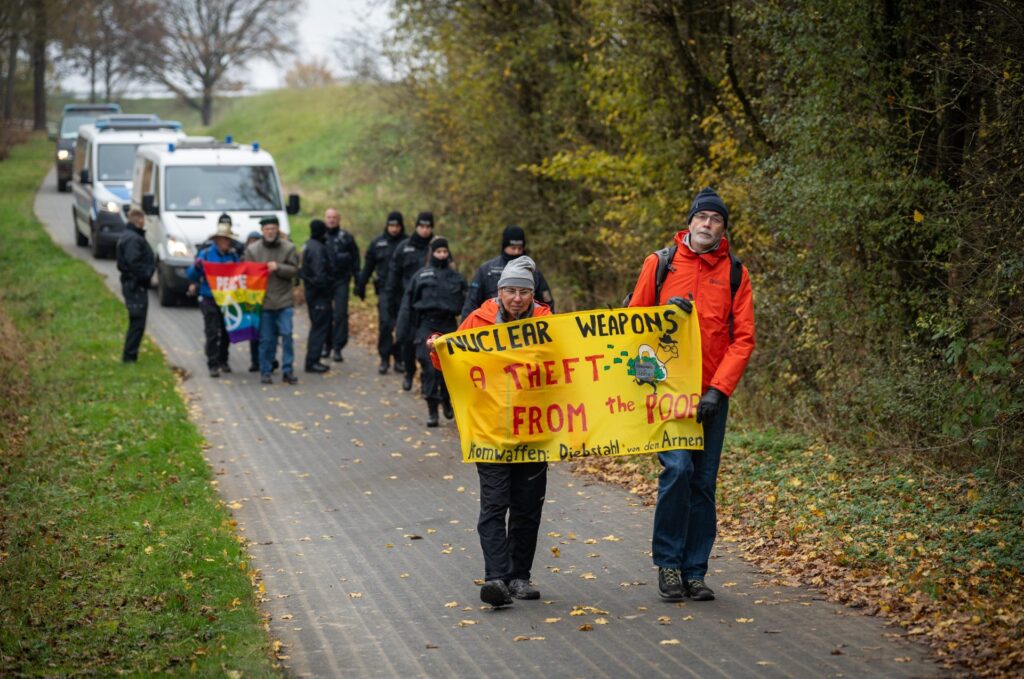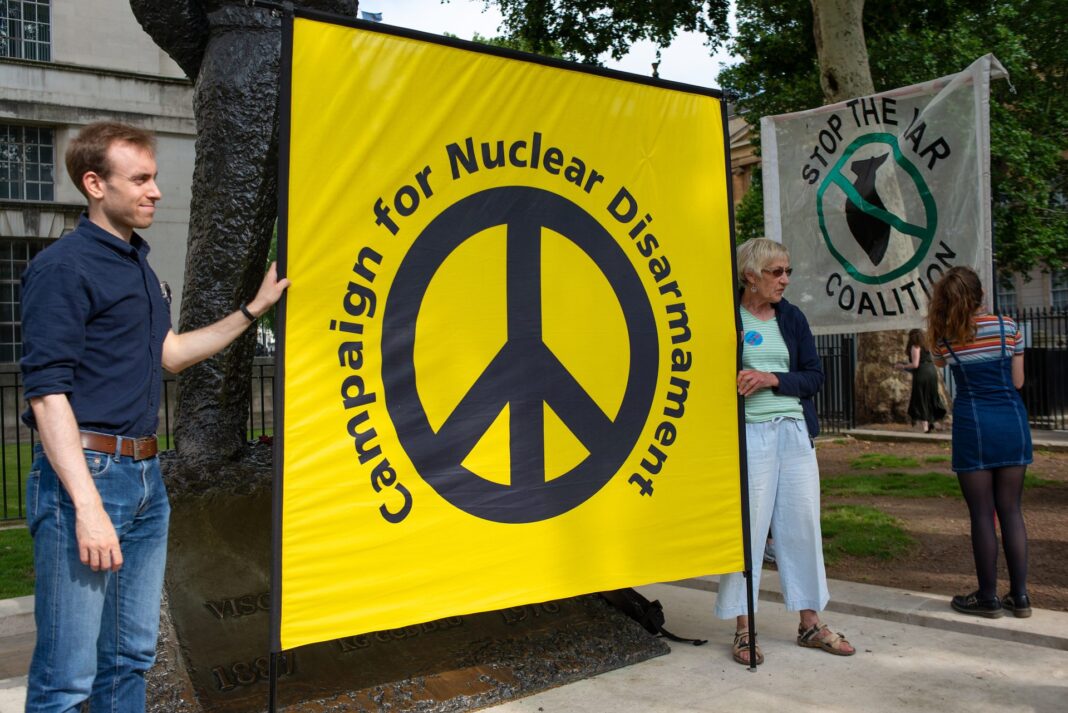By Saqlain Imam
London, UK (London Post) – The current international political climate is witnessing a rise in right-wing populist politics with implications on global security and policies. Populist leaders who are characterised by thumping nationalism and upping defence capabilities as a necessity for national security. (P-20)|GERMAN|JAPANESE|
As populist leaders take the centre stage, treaties like Non-Proliferation Treaty (NPT) or Treaty on the Prohibition of Nuclear Weapons (TPNW) have become even more relevant.
Russia revising nuclear policies
With the largest nuclear arsenal in the world, Russia’s nuclear program reflects right-wing authoritarian leadership led by Vladimir Putin. Preventive measures are central to its military doctrine, complicating global disarmament efforts.
In September 2024, Putin in a televised meeting with high-level officials announced that in case of a “massive air attack” it can use its nuclear weaponry. The newly proposed ruled allowed Russia to consider an attack by a non-nuclear country supported by a nuclear power to be considered as an attack by both.
Following this in November 2024, the US reversed a ban on Ukraine’s use of long-range missiles against Russia. The White House had put this ban on Ukraine, out of concern that Russia could escalate the situation by involving nuclear weapons.
Putin responded by signing the previously proposed changes to its nuclear doctrine, which now allowed the country to use its nuclear arsenal.
The characterization of the West as an existential threat to Russia is one of its main political narratives.
Janes, an open source defence intelligence website observed that Russian actions in 2023–24 included deploying nuclear weapons to Belarus, unveiling new delivery platforms, tactical nuclear drills, and disengagement from treaty obligations.
Mrityunjay Goswami, a research analyst at Indo-Pacific Studies Centre, says strategic experts are seeing trends in right wing governments advocating for using nuclear weapons in real time war scenarios, for example, Russians are clearly emerging as the major voice in this fragile nuclear order, under president Putin and its right wing government, the Russians are now looking for tactical nuclear options in Ukraine war.

India counterweighting China and Pakistan
Prime Minister Narendra Modi who is serving his third-term in power boasts of India’s nuclear capabilities. This year in 2024, the ruling nationalist party, Bharatiya Janata Party, in its manifesto promised to expand the country’s nuclear energy by focusing on developing small modular reactors and increased investment in nuclear energy production.
Modi, a right-wing hardline politician in his election campaign in 2024, attacked India’s opposition party Congress and its allies, saying they will diffuse the country’s nuclear weapons after coming to power.
Modi also criticised one of the national leftist parties, CPI-M, when it vowed to eliminate the nuclear weapons of the country in its election manifesto. Modi further said that while India’s neighbours were armed with nuclear weapons, the opposition parties were planning to make the country “powerless”.
Modi projects himself as a nationalist, a strongman who is building the country’s military and nuclear capabilities. He has mocked Pakistan of being unable to sell its nuclear weapons due to poverty and “low quality”. When his critics said that Pakistan also has a nuclear button, he said that India’s nuclear arsenal is not kept for Diwali (a Hindu festival when crackers are burnt).
Another neighbour of India, China is raising eyebrows of New Delhi for its military buildup – both conventional and nuclear. Goswami comments that China’s rise as a major nuclear power and the emphasis of president Xi on enhancing China’s strategic capabilities indicates that China is seeking parity in terms of nuclear weapons and delivery capabilities with the United States as part of its military modernisation efforts.
On the other hand, right wing voices in Poland and Germany are calling for Europe’s own nuclear deterrent options after the Ukraine invasion.
Iran vs Israel: Increasing rivalry raising tensions
Iran, which does not possess a nuclear weapon as of now, is being watched closely by Western countries and Israel, and often suspected to be in the nuclear arms race.
Director General of the International Atomic Energy Agency (IAEA), Rafael Mariano said on 6 December, 2024 that Iran is “dramatically” accelerating its enrichment of Uranium to up to 60 percent purity (90 percent level that is considered as weapons grade)
Iranian President-elect Masoud Pezeshkian has said that the country is not “seeking nuclear weapons”. Tehran has reiterated to be pursuing a peaceful nuclear program transparently and under IAEA supervision within the framework of the Non-Proliferation Treaty and the Comprehensive Safeguards Agreement.
As Donald Trump came to power, tensions around Iran’s nuclear capabilities have heightened. When Trump was in power he pulled out from the Iran nuclear deal also known as Joint Comprehensive Plan of Action (JCPOA) which had put restrictions on Iran’s nuclear program in exchange for the relaxation of some international sanctions on Iran.
“I will do everything in my power to prevent Iran from getting nuclear weapons”, Israeli Prime Minister Netanyahu had said in 2023.
Israeli Prime Minister Netanyahu’s government hit and destroyed Iran’s nuclear research site in November 2024. While the tensions of a nuclear escalation were rising, Tehran’s military heads also pledged a crushing response to Tel Aviv.
The move was a blow to the efforts of nuclear disarmament. Israel, which is estimated to have about 90 nuclear weapons, remains one of the countries which have not joined the Treaty on the Non-Proliferation of Nuclear Weapons (NPT).
“Eliminating Israel’s nuclear weapons and ensuring that Iran or any other state in the Middle East never acquires them is vital to ensuring the long-term security of all people in the region”, The International Campaign to Abolish Nuclear Weapons (ICAN) comments.
Nuclear Disarmament debate is facing existential crisis due to American and Russian disengagement and China’s dipping willingness to engage in any bilateral or trilateral nuclear disarmament negotiations. As a result, the strategic communication channels need to be relooked among major nuclear powers, and experts are not seeing progress in the near future in this aspect, Goswami adds.
Author: Saqlain Imam, Political Analyst/Ex-Journalist at BBC, World Service London, England, United Kingdom.
This article is produced to you by London Post, in collaboration with INPS Japan and Soka Gakkai International, in consultative status with UN ECOSOC.
INPS Japan




